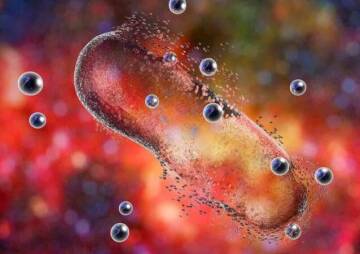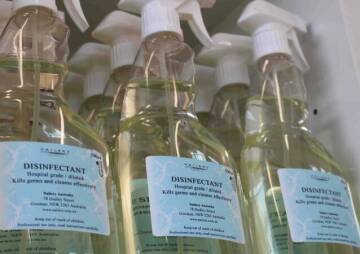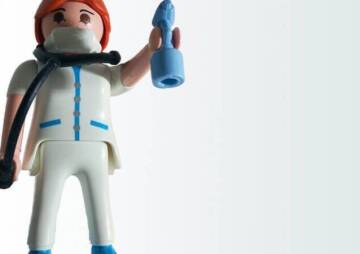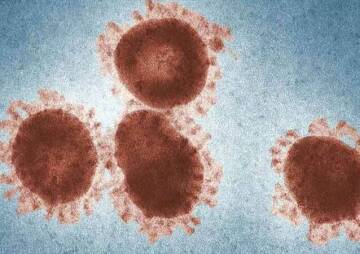-
Category
Craniomaxillofacial Surgery
Orthopedic Surgery
Spine Surgery
Orthopedic Implants
Hip Surgery
Knee Surgery
Pectus Excavatum
Bone Graft
Disinfectants
Healthcare
Investigate the problems that hospital detergents pose to nurses
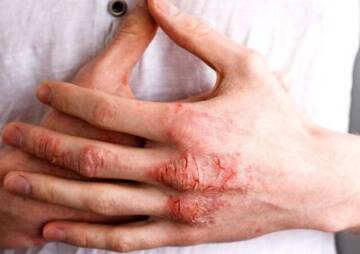
Most of the nosocomial infections that patients contract after admission are transmitted to patients by nurses' hand microorganisms. This article outlines ways to prevent these problems.
One of the global problems that is especially prevalent these days is nosocomial infections. These infections are transmitted to patients during hospitalization and usually present 48 hours after hospitalization. Studies have shown that about 40% of these infections are transmitted to patients through hospital staff. Hand hygiene (HH) is the simplest and most effective way to prevent these infections. That is why this issue is so important in the World Health Organization. Despite the progress and simplicity of infection control, there are still problems in this area. One of them is the study of problems caused by hospital detergents for nurses and treatment staff.
How do nosocomial infections develop in patients?
Most nosocomial infections that patients develop after admission are transmitted to patients by microorganisms in the hands of staff and nurses. These people have the most contact with patients. Washing hands alone can be the most important way to prevent the spread of infectious diseases. In addition, the use of disinfectant solutions is also useful.
More types of disinfectants in hospitals not miss.
Hospital personnel are required to wash their hands immediately before touching the patient, before or after handling medical equipment, after contact with patient-related equipment, after contact with contaminated blood, fluids and surfaces, and immediately after removing gloves. And disinfect.

Inadequate washing or improper hand washing can lead to the spread of nosocomial infections, which can lead to pandemic infections, even in severe cases. But it is not always easy for nurses to wash and disinfect their hands. Why?
- Sometimes access to detergents and disinfectants is not available or the disinfectant liquid is not of the required quality to kill germs.
- Sometimes nurses do not have enough time to wash their hands. Or washing the hands interferes with the treatment process of patients, especially in emergencies.
- Sometimes they do not do this due to fatigue and lack of motivation to work.
- Sometimes problems with the use of these detergents irritate the skin for nurses and therefore reduce their desire for regular washing.
- In rare cases, this negligence may occur due to lack of knowledge and awareness of nurses.

What problems does frequent hand washing cause for nurses?
Soaps have cleansing properties and sometimes antiseptics are added to them. But in general, the antimicrobial activity of soaps is low and frequent hand washing with them also causes dryness or contact dermatitis of the skin. This complication is accompanied by severe dryness, redness and burning of the skin, which will cause nurses to malfunction. Sometimes even water causes skin allergies.

Working with medical latex gloves can also cause skin problems. Some people inherit latex allergies and some develop allergies with long-term use of latex gloves. Even the powder inside the latex gloves is sometimes released into the air when inhaled, causing respiratory allergies.

Alcoholic disinfectants also work well. In most cases, the main ingredient in disinfectants is alcohol, which is combined with water, fragrances and glycerin. These solutions contain 60 to 95% alcohol, usually in the form of ethanol, isopropanol, or n-propanol, and will effectively kill certain types of microorganisms. But after a while, they lose their antimicrobial properties and, of course, have certain side effects, both respiratory and skin, which are not very desirable.
For more information on this, read about the side effects of alcohol disinfectants.

The best solution for nurses to reduce the problems of hospital detergents
There are many ways to solve these problems. One of these methods is to produce and prepare quality and suitable hygienic solutions for hand disinfection that cause less damage to the skin. Antiseptic solutions are one of these substances that are less irritating and dry to the skin. They do not harm the skin or other parts of the body; Kills viruses, bacteria and fungi.
Non-alcoholic hand sanitizers are usually a combination of an antibiotic called triclosan yttrium chlorocarbon and in some cases benzalkonium chloride (BAC). These substances also have antiseptic and antimicrobial properties, to which emollients such as glycerin are added and will soften the skin.

Nanosilver disinfectant is a type of non-alcoholic disinfectant that kills a wide range of microbes. It is effective in killing 99.99% of germs and viruses such as cholera, swine flu, MRSA and norovirus, E-Coli and Salmonella, and is less harmful than alcohol.
Nano Silver Antibacterial Content give you more complete information about nano silver disinfectants.
Concluding remarks
What is certain is that it is not possible for staff to come into contact with patients, and repeated use of detergents will cause special damage to the skin. The use of related creams as a cost-effective solution to prevent skin complications.
The use of antibacterial disinfectants also does some hand washing with soap and water, even in cases where time is of the essence to save the patient's life, is the best method. Of course, these substances must be among the solutions approved by the World Health Organization. Nanosilver solutions are one of these disinfectants that you can get the necessary information from the products section.

